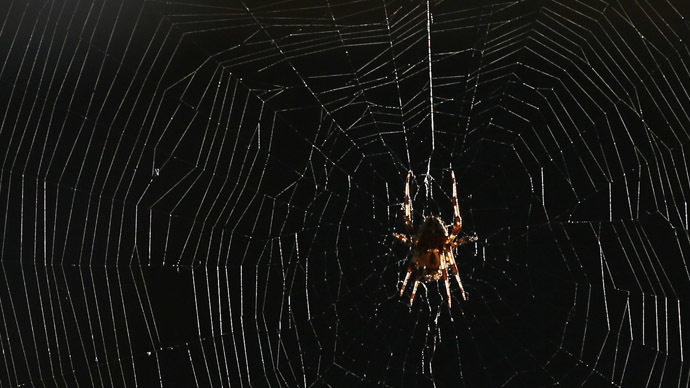© Hereward Holland / Reuters
Silkworms feeding them carbon nanotubes and graphene reinforces the silk.

The discovery is an “easy way to produce high-strength silk fibers on a large scale,” materials scientist Yaopeng Zhang told the outlet.

Reuters/Stefan Wermuth / Reuters
The spiders sprayed with carbon nanotubes created the toughest silk – around 3.5 times stronger than the best natural silk, spun by the giant riverine orb spider.
According to the researchers, the upper-strength capacity of the webs created by the spiders was “the highest reported to date, even when compared to the current knotted fibers.”

via GIPHY
The
extra strong silk could be used in a variety of different ways
including on protective fabrics, biodegradable medical implants and
wearable electronics.
Researchers from Tsinghua University fed the worms mulberry leaves, their food of choice, sprayed with solutions containing 0.2 percent of carbon nanotubes or graphene.
They then collected the silk from their cocoons as is normal in the silk-making process.
It was found that, unlike regular silk, the beefed up version conducts electricity and can withstand at least 50 percent more stress before breaking.

via GIPHY
The method is also simpler and more environmentally friendly than treating already spun silk.
Scientists still aren’t exactly sure how the silkworms incorporate the reinforcements into silk. Or how much of it actually makes it into the silk as opposed to being excreted or absorbed into other parts of the body. rt
Graphene
One-atom-thick graphene is the world’s thinnest, but also strongest, material – 200 times tougher than steel. It is also the world’s best conductor of electricity. Knowing that graphene is impermeable to even the smallest of atoms, hydrogen, Geim's team decided to test whether protons, or hydrogen atoms stripped of their electrons, were also repelled. They were left pleasantly surprised.
Silkworms feeding them carbon nanotubes and graphene reinforces the silk.
Feeding silkworms mulberry leaves sprayed with carbon
nanomaterials yields strong silk strands that conduct electricity.
Credit: SarDiuS/Shutterstock
Researchers have figured out a way of creating superstrong silk by changing silkworm’s diets.
Silkworms
spin their delicate threads from silk protein produced in their
salivary glands. Scientists have now discovered that feeding them carbon
nanotubes and graphene reinforces the silk that the larvae produce,
resulting in “Spiderman-strength” threads, Chemical & Engineering News has reported.The discovery is an “easy way to produce high-strength silk fibers on a large scale,” materials scientist Yaopeng Zhang told the outlet.

Reuters/Stefan Wermuth / Reuters
The spiders sprayed with carbon nanotubes created the toughest silk – around 3.5 times stronger than the best natural silk, spun by the giant riverine orb spider.
According to the researchers, the upper-strength capacity of the webs created by the spiders was “the highest reported to date, even when compared to the current knotted fibers.”

via GIPHY
Researchers from Tsinghua University fed the worms mulberry leaves, their food of choice, sprayed with solutions containing 0.2 percent of carbon nanotubes or graphene.
They then collected the silk from their cocoons as is normal in the silk-making process.
It was found that, unlike regular silk, the beefed up version conducts electricity and can withstand at least 50 percent more stress before breaking.

via GIPHY
Scientists still aren’t exactly sure how the silkworms incorporate the reinforcements into silk. Or how much of it actually makes it into the silk as opposed to being excreted or absorbed into other parts of the body. rt
Graphene
One-atom-thick graphene is the world’s thinnest, but also strongest, material – 200 times tougher than steel. It is also the world’s best conductor of electricity. Knowing that graphene is impermeable to even the smallest of atoms, hydrogen, Geim's team decided to test whether protons, or hydrogen atoms stripped of their electrons, were also repelled. They were left pleasantly surprised.


Post a Comment Blogger Facebook Disqus